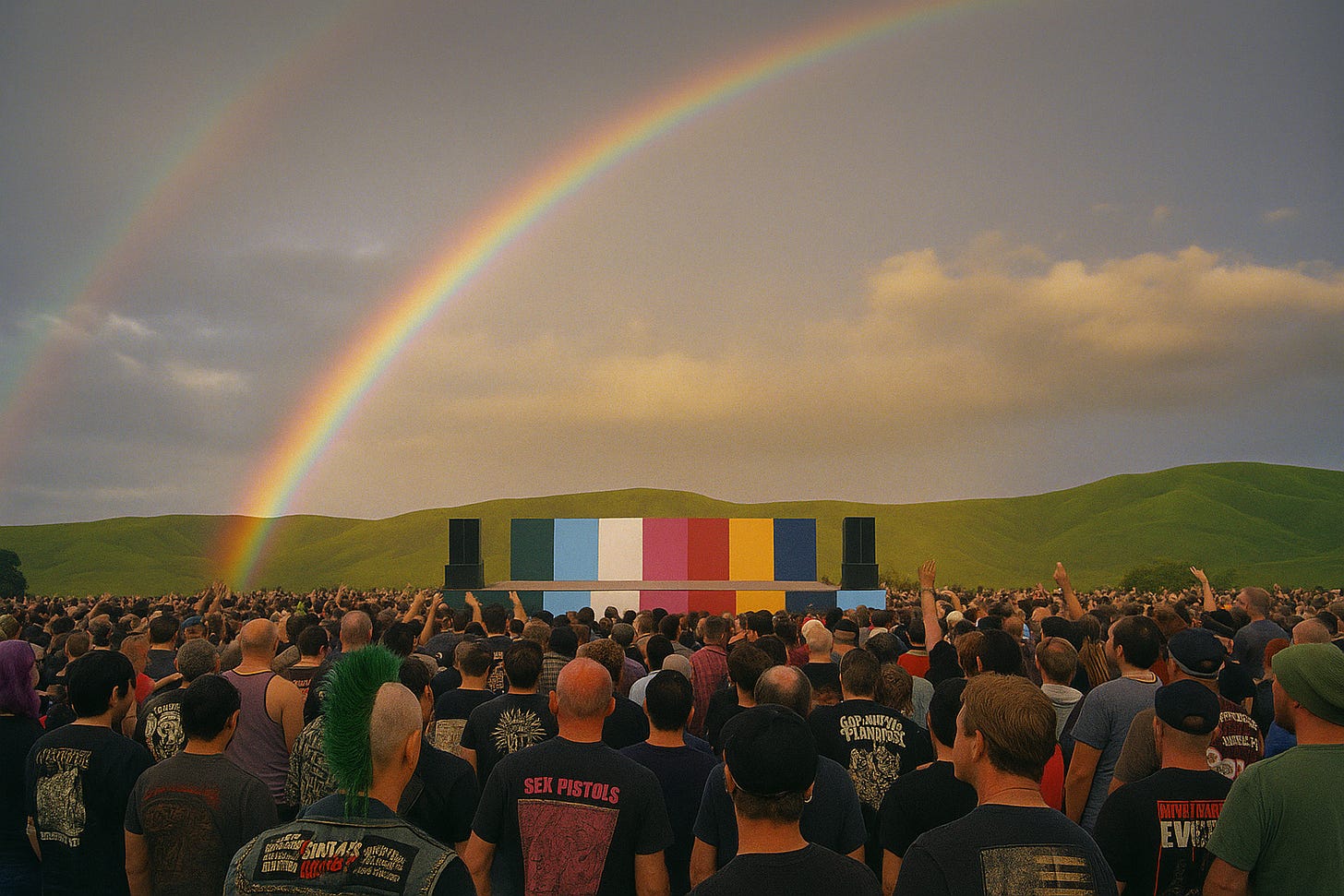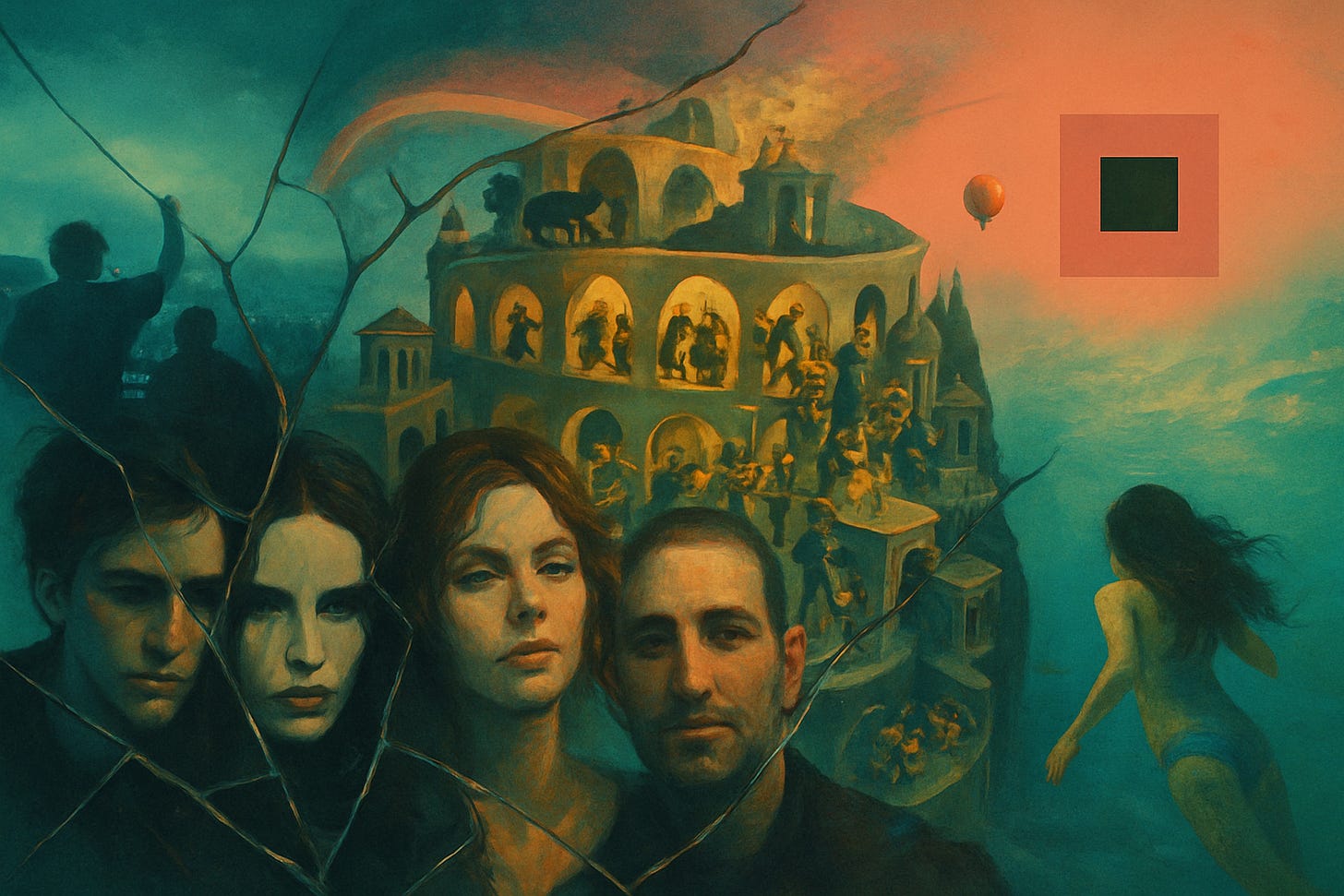In Full Bloom
What Music Still Offers: Joy, Connection, and Proof We're Alive, Or The Best Music of 2025 (So Far)
We've hit the midway point of 2025, which means it's time for that most reliable of content strategies: the midyear music roundup. Every outlet does this because it works. Why? Well, people love lists, rankings, and the validation that comes from learning they've been listening to the "right" albums (Congrats, tastemaker! Your eventual year-end Spotify Wrapped is on track for being rather shareworthy).
But something happened last week at a show featuring the Baltimore punk band Turnstile that made me reconsider what I actually want from music in 2025. I went to see them at Under the K Bridge, a makeshift venue in Brooklyn literally under a bridge, with my friend Sam fully braced for us to be the token middle-aged guys surrounded by kids half our age. Instead, while buying a t-shirt for my daughter Edie, I found myself in line behind another clearly suburban dad doing the exact same thing. The security guard assumed we were together, which felt both amusing and oddly validating. At least no one mistook us for narcs.
The crowd turned out to be far more mixed than I'd anticipated. Not just twenty-somethings in sad basics, but people my age, older, younger, all losing themselves to the same euphoric hardcore. What struck me wasn't just the diversity but the authenticity of connection between band and audience. This felt impossibly old school, like the '90s punk rock scene but scaled up x 10,000. Genuine community rather than performed tribalism.
There's something deliberate about how Turnstile cultivates this (I’ll get into their music more in a moment and why their latest album Never Enough warrants so much attention). Even their promotional aesthetic nods to their commitment to communal celebration—their recent album film shown in select theaters for one night only borrows heavily from Jimi Hendrix's colorful Woodstock stage design—it's not accidental that they're invoking perhaps one of the most famous moments of music as shared transcendence. Turnstile vocalist Brandon Yates isn't Hendrix, obviously, but there's a through-line there about music as collective experience rather than individual consumption.
Which brings me to the albums that have been sustaining me this year, records that offer something our fragmented cultural moment desperately needs.
First, let’s unpack the baggage.
Turnstile's Never Enough isn't a reinvention. After a four-year gap since its predecessor Glow On, some critics have predictably complained about the band playing it safe, delivering more of the same melodic hardcore that made them beloved in the first place. The Ringer’s Arielle Gordon called the album "stagnant," comparing listening to it to "watching Law & Order: SVU in its 26th season: The plot points might be technically new, but the climax is eerily predictable." Anthony Fantano, of the Needle Drop YouTube channel said, “So with [the] insanely positive reception behind [Glow On], one that frankly a lot of rock bands would kill for, I guess what choice does Turnstile have but to double down on this direction and push it even further a bit, which is what they do on this album.”
This is a cynical take that gets angry at a band for being consistent. 'More of the same' doesn’t have to be creative stagnation—in this case, it sounds like creative confidence. But enough oxygen wasted on the haters.
What the critics miss is how confidently Turnstile moves through their influences. Yes, you can hear Perry Farrell's wild abandon on the thumping "Sunshower," The Cure's atmospheric drama in the opening of "I Care," even echoes of Police on "Seein' Birds" (don’t front–we all used to love Sting before he picked up the lute) But Turnstile wears these touchstones lightly, weaving them into their signature watercolor reverb-drenched hardcore without losing what made them special in the first place. They've figured out how to stretch their creative muscles without pulling anything.
When Yates screams about hanging by a thread or giving himself away because he cares, the vulnerability cuts through the bombastic delivery like sunlight through storm clouds. His musical influences, revealed in a Guardian listening diary, are wonderfully eclectic; Enya, Björk, and Bill Withers among his daily rotation. "Even going for a run, I don't always need super high energy, aggressive music—I'll run to Enya or something like that," he explained. This is insane but also adorable, and it explains a lot about why Turnstile sounds like no other "hardcore" band.
The "hardcore" label probably scares people away, and that's a shame because it's fundamentally misleading. What Turnstile actually traffics in is joy so pure it borders on therapeutic. And no, they're not inventing the wheel here, but they're definitely using 4WD, and they're driving somewhere worth going. In a culture obsessed with constant reinvention, Turnstile understands that sometimes the mission statement is to perfect what you're already good at.
There's a double rainbow on the album cover art, which may or may not reference that 2010 viral video where Paul "Bear" Vasquez wondered aloud about the double rainbow’s meaning and exclaimed "Too much!" Probably not intentional, but those sentiments—wonder, overwhelm, the beautiful excess of it all—perfectly capture what Turnstile offers. In a moment when everything feels calculated and optimized, they provide something refreshingly abundant: too much joy, too much sincerity, too much unguarded emotion making their new album title feel less like a lament and more like a dare.
As a former music journalist, I know how this industry works. Debut albums get coverage. Breakthrough artists get attention. The new and shiny always wins over the sustained and excellent. Editors greenlight pitches about unknown bands with mysterious backstories; they're less interested in an established artist's sixth album, no matter how good it might be.
But some of the most vital music I've encountered this year comes from artists who've moved far past the hype cycle—musicians who've traded buzz for mastery, novelty for depth. These aren't breakthrough albums; they're proof that the most essential art often comes from people who've stopped trying to prove themselves and started focusing on what they actually want to say.
Sharon Van Etten - Sharon Van Etten and the Attachment Theory opens with the question "Who wants to live forever?" before diving into "Afterlife" with its haunting refrain: "Will you see me in the afterlife? / Will you tell me what you think it's like?” Obviously, mortality is on Van Etten’s mind as it’s on many of ours. For her latest release, and first with a band, the singer/ songwriter is channeling the high drama of Kate Bush and mid-80s goth (her tour t-shirt's font choice? Gothic, of course), six albums into a career that's figured out how to process difficult emotions without drowning in them. Her voice carries hard-won wisdom about sitting with mortality, love, and loss without being consumed by any of it. This is music that understands that sometimes the most healing thing you can do is lean into the darkness until you find the light on the other side.
King Gizzard & the Lizard Wizard - Phantom Island represents the band's 27th (!) studio album—this time an orchestral prog-rock collaboration that I'll be experiencing live this summer when they perform with the Orchestra of St. Luke's. I don't necessarily always "get" King Gizzard, and it often feels like the band could benefit from an editor. Yet they epitomize a can-do spirit where no one ever says no. A doom metal album? Sure! A krautrock homage? Why not? An orchestral album? Duuuude, now you're talking. Phantom Island proves that even when they're working with symphonic arrangements, they still approach music-making with the curiosity of teenagers discovering distortion for the first time. Their creative joy feels like its own form of resistance, proof that artistic passion doesn't have to calcify with commercial success.
Marconi Union - The Fear of Never Landing I've been on an ambient kick of late (not an Ambien kick, though based on my stress levels, perhaps I should consider that too), and Marconi Union’s 12th mostly wordless album is a sublime and serene journey created by the duo of Richard Talbot and Jamie Crossley. I was introduced to Marconi Union by my yoga instructor—not kidding—and it's proven to be brilliant background music, conducive to both creativity and serenity. (Their 2012 track "Weightless Part I" is cited as the most relaxing song ever recorded; a study at the Sussex Innovation Centre in Brighton found that listening to it reduced patients' anxiety by up to 65%.) The manipulated Air-y vocals on "Eight Miles High Alone" showcase their evolved sound while maintaining their scientifically proven ability to soothe frayed nerves. "In Motion" boasts a subtle propulsion, meaning it's optimal for either lying on a beach or running on one. If you're not afraid of the thoughts in your head, Marconi Union will help you explore them.
Bon Iver - SABLE/fABLE continues Justin Vernon's project of turning introspection into communion. As I explored in an earlier piece about this transcendent album, these aren't songs you simply hear; they're emotional states you inhabit. What's become clear over months of listening is its staying power, and the way it continues revealing new layers, new moments of beauty that somehow escaped previous listens. Vernon has created proof that solitude can heal rather than isolate when approached with intention and artistic precision.
Ludovico Einaudi - The Summer Portraits is a strange album for me to be obsessed with. For one, it’s transcendentally uncool stuff that I discovered through my SiriusXM Classical channel. But it's helped me focus when I needed to and calmed me down when life felt overwhelming. It also sounds like my own personal movie soundtrack, transporting me to inhabit a world in which Denis Villeneuve is directing a remake of Amélie. Four decades into his career, Einaudi has perfected the art of making beauty that doesn't demand anything from you except presence. In a world designed to fracture our attention, these compositions feel like beautiful ethereality coming into focus
Röyksopp - True Electric comes from a Norwegian DJ duo already 25+ years into their career, and this compilation of dance remixes of older tracks serves as a reminder of how consistently great their music has been. Their impeccable taste in collaborators shines throughout—Robyn, Fever Ray, Alison Goldfrapp, and Susanne Sundfør among others all make highly dramatic vocal contributions that elevate the electronic framework into something genuinely urgent. Röyksopp isn't cool and mysterious like Daft Punk, nor are they Vegas-friendly like Deadmau5. They're two Swedish dudes who truly understand how to communicate to the heart and hips simultaneously, creating beats that pulse with genuine warmth rather than algorithmic precision.
None of these are debut albums. Most come from artists deep into established careers, long past the point where industry tastemakers pay automatic attention. But that's exactly why they matter right now.
These musicians have moved beyond the need to prove themselves. They've found their voices and learned to use them with precision and purpose. In a cultural moment defined by anxiety, grievance, and the exhausting performance of daily life, these albums function as proof that other emotional states remain accessible.
Not through denial or toxic positivity, but through the simple act of creation that prioritizes human experience over market demands. When everything else feels broken—when social interactions feel fraught, when the news cycle never stops grinding, when even entertainment feels like work—music remains one of the few things that can reliably deliver what it promises.
Standing in that crowd under the K Bridge last week, sweating and smiling and completely present while Sam and I lost ourselves in the communal euphoria, I was reminded that some experiences can't be digitally optimized. Some forms of transcendence require showing up in person, with your actual body, ready to be moved by sounds made by humans who understand that music's highest purpose isn't entertainment—it's proof of life itself.




